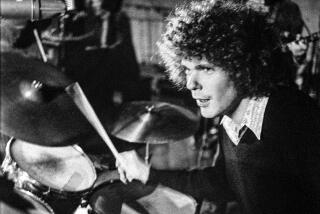A Story That Has No Moral
- Share via
MORRO BAY — Midway through his Saturday night of murder--after he killed three men he blamed for an eviction, before he took a shotgun into a card room to settle another old score--the lanky eccentric known to locals as Crazy Jim paused to record his explanations. His note, printed with a trembling hand, filled the back of an auto parts receipt. It would be found later, after he had committed suicide, the seventh and last to die.
“I have been persecuted all my life by people,” wrote the 43-year-old actor, whose real name was Lynwood Drake III but who, when it ended last Sunday, had assumed the identity of Wild West outlaw Jesse Cole Younger. Among tormentors he listed his mother, his “dead old man who came from hell,” his sisters, his in-laws.
“They all refused to help,” he wrote. “Damn the American Family to hell.”
With his note, Drake got the drop on us reporters, preachers, barflies and other on-the-fly sociologists who would come looking for larger lessons in the murder rampage, for the moral of the story. It’s a common response in these cases: We plumb for deeper meaning to take the edge off chaos, to produce explanations and story angles that give the pointless a point. Thus, a gunman’s assault on a San Ysidro McDonald’s drifts into a debate over police tactics and fast-food chemicals. Thus, a nightmare on a Stockton schoolyard results in marginally tougher regulations for automatic weapons. Thus, Crazy Jim’s twisted vengeance is framed as a failure of family.
*
Not everyone subscribed to Drake’s bottom line. For the granddaughter of 80-year-old Andy Zatko, a local character who was among the first to die, the larger point was the universal need for psychoanalysis. An actress, Cynthia Brooks, said she had promoted counseling before. Now, she intended to push harder, do the talk shows, go to Washington. “The message,” Brooks said, “is that we all have potential to be a loose cannon.”
Others saw it as a place story. It was suggested that Drake, a bit-part actor and failed card shark who had come from Redondo Beach, represented the extreme example of what horrors lie ahead as more people move up from L.A. Still others looked inward, asking how something so terrible could happen in a place so serene. “The idea,” concluded the town’s new mayor, “is to simply start treating your fellow citizens with friendliness and respect.”
Drake’s past was sifted. It seemed important, as a hedge against future loose cannons, to document the early signs of trouble. “Somebody like that just doesn’t happen,” a boyhood friend of the troubled man told reporters. “He gets created.” So readers were served up all the details--Drake’s fascination with Wild West characters, his unexplained “problems” with his father, his battle with leg cancer, his obsession with his daughter, his habit of never knocking on doors. They were provided pictures of Drake posing with a plastic weapon. They were informed how, two days before the murder rampage, he had played poker for 15 hours straight, lost everything and wept like a baby.
Most disturbing to some was that while Drake babbled to everyone he met about hit lists and vengeance, nobody ever warned the authorities. “I have asked them all why they didn’t say anything,” a detective said, “but have gotten no real answers.” By late last week, people were saying they were “Draked out.” Funerals had begun, a last crack at higher meaning: “Death tends to make our faith stronger,” went one eulogy. “It makes us look to God for answers. It makes us wonder.”
*
I came here looking to find a moral or two myself. I was curious if the killer ever received mental health care and how he came to possess his guns. These angles held promise. There were suggestions Drake had been directed to counselors at least three times and had obtained his weapons through less than legal means.
Along the way, though, I lost interest in angles and lessons. The more I bumped into other seekers of larger meaning, the more I doubted there was any. I know why the aggrieved must testify before Congress, why preachers preach heavenly reason and newspapers make human madness conform to familiar story lines. These processes provide a measure of comfort, a sense of regained control.
But beyond that, on this day, I doubt any of it matters. The moral of Crazy Jim’s murder rampage is that it has none. He was just one more crazy man who went off and took six people with him. We will never build a net big enough to catch all the nuts, will never construct laws strong enough to remove their weapons. We can pray. We can duck. We can also count on it happening again--another locale, another loon, another weapon, another story.
More to Read
Sign up for Essential California
The most important California stories and recommendations in your inbox every morning.
You may occasionally receive promotional content from the Los Angeles Times.














